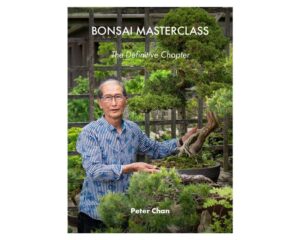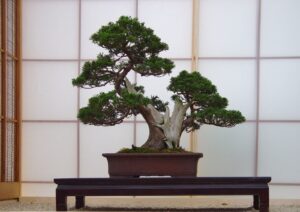An Intimate Conversation with the Bonsai Maestro: Peter Chan
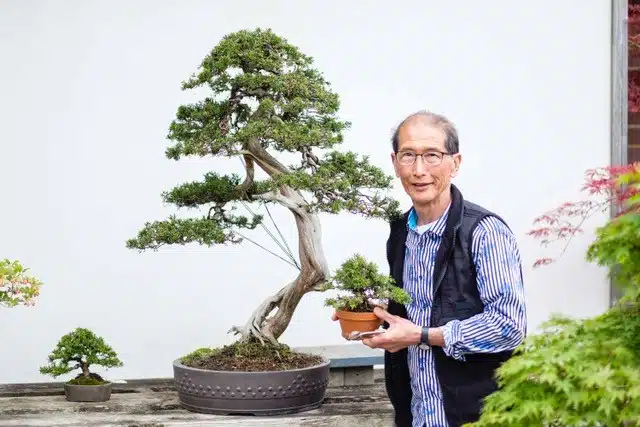
In the world of bonsai, few names resonate as profoundly as that of Peter Chan. A self-taught artist, an award-winning gardener, a revered author, and a passionate dancer, Chan embodies the spirit of continuous learning and the pursuit of excellence. From his transformative journey that began on a London balcony in the late 1960s to establishing Britain’s premier bonsai nursery, ‘Herons Bonsai‘, Peter’s life story is as intricate and captivating as the trees he so lovingly shapes. As he continues to inspire countless enthusiasts through his books—many of which are now treasured collectibles—and his popular YouTube channel, on the occasion of his upcoming visit to Mistral Bonsai during Bonsai Conference 2024 on 13 and 14 April, we sat down with Peter to delve deeper into his world. Join us as we explore the roots of his passion, the branches of his numerous talents, and the future growth he envisions in the enchanting realm of bonsai.
Peter, what initially inspired you to delve into the world of bonsai, and how was your experience being self-taught in this art?
When I got married in 1966, our first home was an apartment with a balcony, and since I was interested in gardening everything I grew had to be planted in pots. I was making pottery as a hobby at that time, so I made some pots for my plants too. That was the start of my bonsai journey. I experimented with plants growing in small pots, and all my experience was derived from that.
Before fully immersing yourself in bonsai, you worked as an electrical engineer and speech writer. How did that background influence your approach to bonsai and the establishment of Herons Bonsai?
As an engineer in the UK Electricity industry and then working later in the UK government service as an energy policy adviser, my job was to solve problems. With an enquiring mind I always tried to understand the science behind everything including how plants and in particular – how bonsai grow. I even see my business as a challenge and a problem solving exercise.
Herons Bonsai Nursery
How was the journey of turning your passion for bonsai into a thriving business? What challenges did you face when setting up “Herons Bonsai”?
Starting any business is difficult. I had to do two jobs for three years when I started “Herons Bonsai Nursery”. I could not give up my government job for those three years, as the bonsai could not support my family. So it was very difficult at the start.
Often hailed as the “world’s most prestigious flower show,” the Chelsea Flower Show, organized by the Royal Horticultural Society in London, has been a cornerstone in the gardening calendar since 1913. It showcases the pinnacle of garden design and horticultural practices, drawing exhibitors and visitors from all over the globe. With your impressive track record, you’ve garnered numerous Gold Medals at this iconic event. Which do you consider your most memorable exhibit and why?
Yes – I was showing at the Chelsea Flower Show since 1993 long before I ever had any idea of turning my bonsai hobby into a business. I won 21 Chelsea Gold medals until I decided to give you a showing at Chelsea in 2006. My displays were always groundbreaking.
Your books have not only served as foundational texts for many bonsai enthusiasts but have also become sought-after treasures, with several editions now out of print. Given their lasting impact and the demand, do you have any plans to revisit or reprint these classics? Furthermore, are there any new writing projects or books on bonsai currently in the works?
I have written 9 books (or 10 if you include the revised version of my second book “Bonsai Masterclass”). I have a good command of English and as I was a speech writer, the art of writing comes easily for me. I doubt if I will write another book, as my YouTube channel is my preferred method of communication.
Apart from bonsai, you’ve also ventured into designing and creating Japanese gardens. How do these two arts complement each other, and what drives you to engage in garden construction?
Making Japanese gardens is really an extension of bonsai, as the aesthetics are very similar. I also like Japanese culture, although I am not Japanese myself. I always regarded Japanese gardening as a challenge – but it was also another source of income for our business. So doing something enjoyable and earning from it is no bad thing.
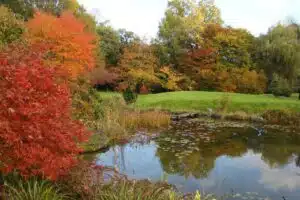
In addition to your love for bonsai, you’re also passionate about dancing, particularly ballroom and Modern Jive. How did your interest in dance start, and how do you balance this passion alongside your bonsai work?
My dear suffered cancer for 27 years before she passed away. When she was ill, she encouraged me to have a social life. So I took up dancing, which is both a social and enjoyable. I now dance West Coast Swing and Expressive Dance. If I had another life, I would love to learn Flamenco! Perhaps you can arrange that for me (joking).
Peter, we’ve talked about your love for bonsai and dance, but I’m curious: Do you have any quirky hobbies or unusual interests that people might be surprised to learn about? Perhaps a favourite unconventional gardening tool, or a dance move you’ve been trying to perfect during your free time?
In my youth, I was the Indian Cycling champion of Eastern India. I learnt to swim late in life at the age of 55, and went on to become a swimming coach. I love keeping fit and am still very active physically – hence my physique.
You received the ‘Distinguished Alumnus Award’ from the prestigious Indian Institute of Technology – Kharagpur. What did this recognition mean to you, and how has your educational background influenced your bonsai career?
The Indian Institute of Technology at Kharagpur is India’s greatest technology university. The worldwide chief of Google -Mr Sundar Pichai is a graduate of 1993, whereas I graduated in 1962. Our Institute has produced some very famous entrepreneurs in the world. Again, my engineering training has helped me no end in life. Problem solving and striving for excellence are all part of that training I derived from my education.
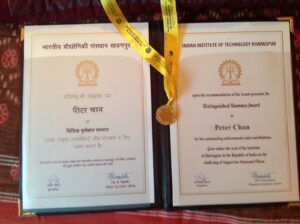
Given your extensive travels and diverse background, is there a particular place in the world you’ve been that unexpectedly influenced or inspired Peter Chan bonsai creations? Maybe a fun travel story related to bonsai?
My recent visit to Taiwan to see bonsai has left me in awe of what the Taiwanese are creating there. We have so much to learn from them. Every culture has something to teach the rest of the world. No one should be so arrogant to think that only they are the best. There is always someone better than you.
No one should be so arrogant to think that only they are the best. There is always someone better than you.
Your YouTube channel has garnered significant popularity. What motivated you to embark on this venture, and how has the experience of connecting with bonsai enthusiasts globally via this platform been for you?
My YouTube Channel is now my mission in life. I have found that it is more powerful than the written word. I teach in a simple, uncomplicated way and my audience like that very much. I am surprised that in such a short space of time I have almost half a million subscribers and over 50 million views, which for bonsai is no mean achievement.
After decades in the bonsai realm with numerous accolades to your name, what are your plans and aspirations for the future in the world of bonsai?
I enjoy bonsai, and I see my mission in life as a teacher and mentor.
A Juniperus from Peter Chan’s collection. Picture from herons.co.uk
I enjoy bonsai, and I see my mission in life as a teacher and mentor.
Do you think that the art of bonsai and its philosophy can change or even improve our daily lives and, consequently, our society. How?
A true lover of nature and a true lover of bonsai should be humble. I live a fairly simple life, and my aim in life is to be a decent human being – That is all I want to be.
What advice would Peter Chan give to someone starting out in the world of bonsai and aspiring to reach a level of mastery like yours?
Be true to yourself – don’t worry too much about what people say or think about you. Do bonsai for enjoyment and not for fame or the praise of others.
As our conversation draws to a close, it becomes evident that Peter Chan is not just a master of bonsai but a maestro of life, intertwining art, nature, and passion in everything he does. His tales of dedication, innovation, and love for both the art of bonsai and dance remind us of the beauty that can be found in the details and the joy of nurturing growth, be it in trees or in ourselves. We’re left inspired, not just by the exquisite bonsais that Peter crafts, but also by the rich tapestry of experiences and insights he generously shared. As he continues to shape, teach, and inspire, one thing is clear: Peter Chan’s legacy will branch out for generations to come, touching lives and green – thumbs across the world.
On 13 and 14 April, due to the Bonsai Conference 2024, we will enjoy Peter Chan’s knowledge in person. An exclusive opportunity, free of charge, to assist to a demonstration of an authentic reference in the bonsai world. Are you going to miss it?
About the Author
Mistral Bonsai
In Mistral Bonsai we are a communication team, technicians and masters committed from the first day to disseminating the wonderful art of bonsai. A world that offers many things to share. We believe that a bonsai is a tree with a soul, unique and unrepeatable. Another of our most essential pillars is, how could it be otherwise, our close commitment to the preservation of the environment and nature.
Categories
Bonsai cultivation and care (60)
Bonsai gift (2)
Bonsai pests and diseases (7)
Bonsai repotting (3)
Bonsai species (1)
bonsai substrates (2)
Bonsai summer (1)
bonsai tools (1)
Bonsai work (13)
Ceramic pots (3)
Chinese culture (2)
Chinese culture (1)
Coniferous bonsai (2)
Conifers (1)


